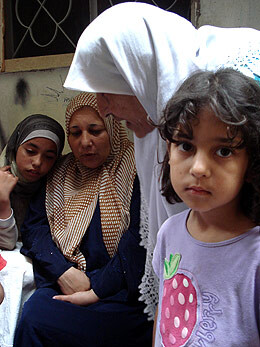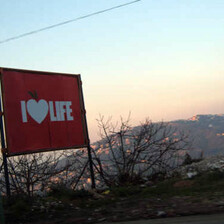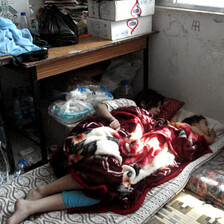Shatila refugee camp 26 May 2007

Palestinian refugees in Shatila camp are opening their doors to those fleeing the violence in Nahr al-Bared camp. (Dr. Marcy Newman)
“Help us help the families hosting their relatives from Nahr al-Bared; any donations would be appreciated,” the person on the loudspeaker called out.
I went to the site appointed for donations collection, and met a woman asking if clothes were among the needed items. “These are old clothes, like the ones we wear, I swear, I am not differentiating between my family and them. I wish I had money but this is all what I could find at home,” she said. “Thank you Hajjeh, anything is appreciated,” the social worker said.
In a bit another woman approached the donation site with a pot of food, saying, “As I was cooking, I heard the call for donations, I thought of sharing what I have. I am sorry it is not a meat dish, but the vegetarian grape leaves are good in the summer, they are tasty.” She ends her donation the same as the first woman, “I wish I had money I could give, this is what I have. May God bless you, sons.” She walked away from the site and then came back, suggesting that she could host one or two persons in her house. “I do not have relatives in Nahr al-Bared, so I am not expecting to be hosting anyone, if there are people who will come, please sign in my name. The mattress of the summer is large as we say — meaning that in the summer one can sleep anywhere.”
Nuhad, a social worker from the Najdeh Organization, said that they counted a hundred families in Shatila. Most of them are hosted by their relatives, or people who come from the same village in Palestine. “Till now, things are under control, but as you know, Shatila residents are not that rich, so they can’t really afford to host a family for long; there is a need to help them out. We will see what can be done.”
Nuhad, as well as almost everyone else I talked to in the camp, are very touched by an interview they heard with one of displaced, as he was leaving Nahr al-Bared. Apparently, someone had called for the extermination of Palestinians with chemical weapons. “It is better than this slow death we live, better than the uncertainty that haunts us, better than being displaced over and over and over again. We will relax and make others relax too.” He said these words in tears, and everybody in the camp quoted him out of total disillusionment, anger and helplessness from their unbearable conditions living as refugees.
The state of solidarity in Shatila has nothing to do with Fateh al-Islam. No one talked about them; everybody felt unconcerned with what was going on between the Lebanese Army and this group. After all, they are not Palestinian and have no popularity anywhere. None of the people I spoke to in Shatila expressed any sympathy with Fateh al-Islam; they just showed concern and anger at the way the Lebanese Army is shelling the camp and destroying the houses of the people.
Nadia says that her cousin said seventy percent of his neighborhood in the camp is totally destroyed. “Maybe it is all leveled now.” Nadia, as everybody else in the camp, feels that the Palestinians are paying a price for a fight that has nothing to do with them. It is not a Palestinian group, not a group fighting for the Palestinian or refugee cause, they just were operating from the camp. As for why they had come there, most of the people have the same answer: they always referred to the unbearable conditions of the refugees in the camp, a fact that made them subject to all sorts of exploitation.
Abu Hicham, a seventy-year-old from Sheikh Daoud in Akka (Palestine) — as he insisted on being introduced — suggests that it seems they are hitting two birds with one stone. If the government is the party that armed the group in the first place, positioning them in one of the Palestinian camps, to later play on this fact in order to suggest that the camps are places of terror that need to be under total control of the government, maybe this is a step towards a war they will wage on us before our normalization. “You know daughter, they will need to kill some of us before our domestification.”
Maybe Abu Hicham went too far in his analysis, but what is very obvious in the streets of Beirut is that, unlike the refugees’ feelings of total detachment from Fateh al-Islam, many Lebanese think that it is a Palestinian group and that there is a need to block any Palestinian armed activities. “Palestinians need to be dealt with in Lebanon as King Hussein of Jordan dealt with them. They should be imprisoned, we have got enough of them in previous years,” a sentiment that has been frequently expressed to the Palestinian students in the Arab University and that almost sparked a fight the other day. A sentence that I also have been hearing from many Lebanese in my neighborhood as well as in the media.
“How all this will unfold is still not clear. What is clear, though, it does not look good for us, daughter,” Abu Hicham says. “The future is bleak, as bleak as watching Palestinians being displaced again, and again. How many Nakbas we have to witness before our return, who knows, my daughter, who knows.”
If Shatila residents are pretty sure of their disconnection with Fateh al-Islam, they are pretty sure too that something is awaiting them, something that does not look good.
Mayssoun Sukarieh is a native of Beirut.
Related Links




